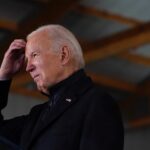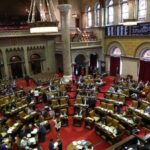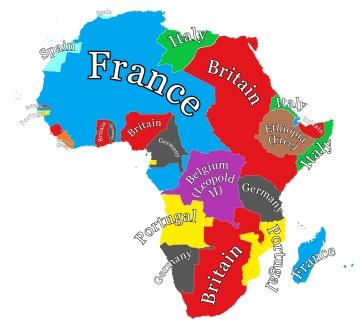U.S. Secretary of State Antony Blinken recently made diplomatic stops across West Africa to continue building U.S.-Africa cooperation. Blinken’s week-long tour across four African countries was aimed at strengthening the US-Africa relationship–a relationship, according to some commentators, already waning as China and Russia are increasing their influence.
Blinken made his first stop in Cape Verde, a small island in West Africa, where he engaged Prime Minister Ulisses Correia e Silva in discussions and reiterated the US dedication to deepening and expanding its collaborations with Africa. Continuing his diplomatic journey, he then proceeded to Ivory Coast, Nigeria, and concluded his tour in Angola.
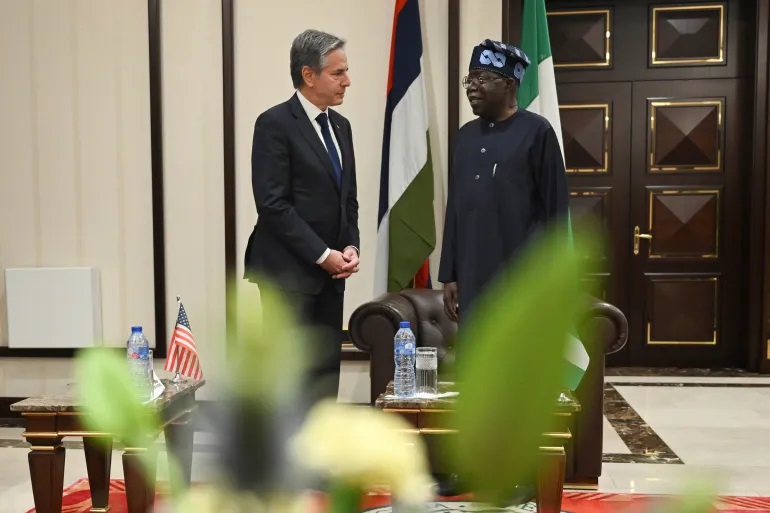
Nigerian President Bola Tinubu and US Secretary of State Antony Blinken speak following a meeting at the Presidential Villa in Abuja, Nigeria, January 23, 2024. Credit-Reuters
While Blicken, on his tour, touted the US as a crucial economic and security ally for Africa, particularly during times of regional and global challenges, analysts say that US foreign policy towards Africa has suggested that the continent may have been “pushed to the back burner.” Their assertions are not baseless.
At the US-Africa Leaders’ Summit in Washington in November 2022, President Joe Biden made commitments to support democracy in Africa and announced his endorsement for a permanent seat for the African Union at the Group of 20. Biden also promised to visit the continent but that dream never materialised as Washington was preoccupied with a host of global challenges, such as the war in Gaza and the Russia-Ukraine war.
Addressing questions about Biden’s unsuccessful visit during an interview in Nigeria, Blinken defended the president by saying, “It is just the opposite. The President very much wants to come to Africa. We have [had] 17 cabinet-level or department-level officials come since the Africa Leaders Summit.”
In Abidjan, the capital of Ivory Coast, Secretary of State Antony Blinken pledged USD 45 million to bolster security along the West African coast. This commitment extends the funding for an ongoing program in the region, bringing the total to USD 300 million. Blinken commended the Ivorian military for their counterinsurgency efforts in combating armed groups, acknowledging the difficulty of the region’s location between Mali and Burkina Faso and recognizing hotspots for violence in the Sahel.
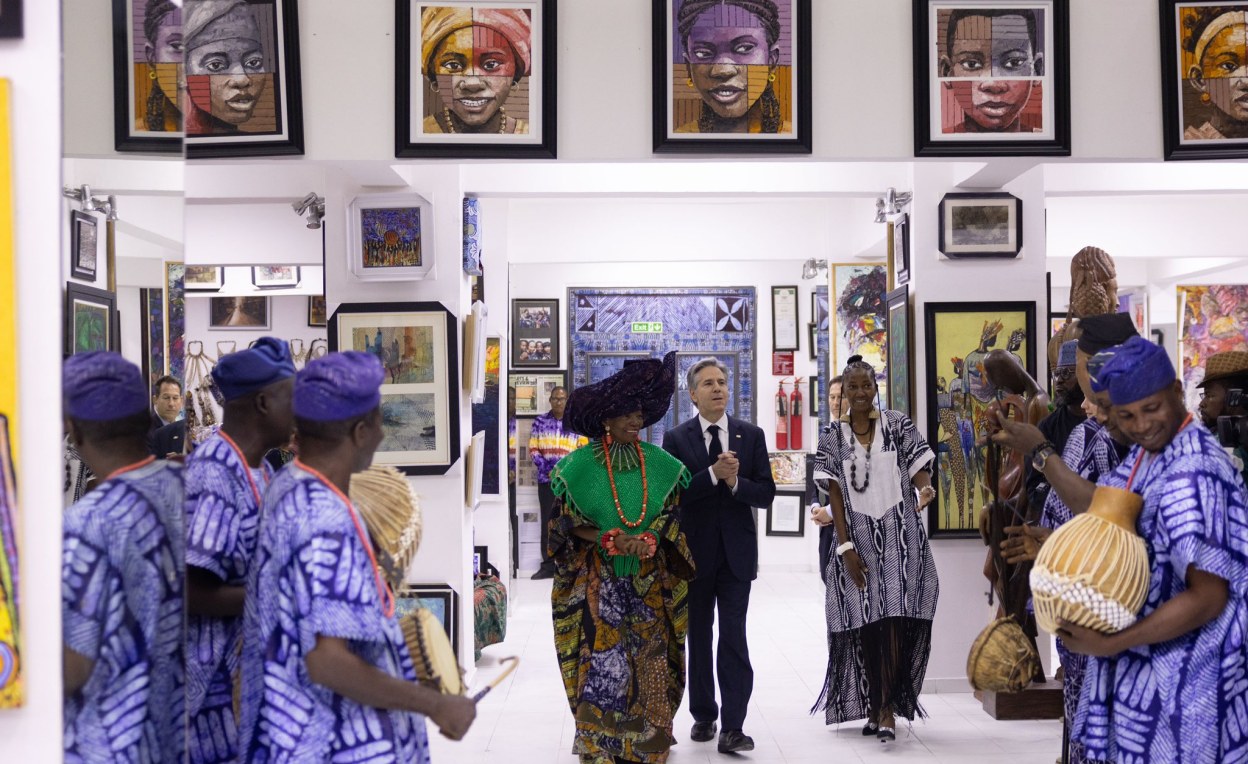
Secretary Antony Blinken visiting the art gallery in Lagos founded by Nike Davies-Okundaye. Credit-USSC
With worsening economic conditions coupled with alarming insecurity as armed groups spread across the region, militaries in the Sahel countries have taken to toppling democratically elected governments. With six successful coups in the region since 2020, almost half of the 16 countries in West Africa are under military control.
These new governments have taken to fresh partners like Russia, which through mercenary forces like the Wagner Group, is expanding its footprint in West Africa, offering the region’s rulers alternative strategic options to the US, France and other traditionally influential European nations.
Experts say the trips by US officials to eight functioning democracies are borne of a need to reassure Washington’s remaining allies in the region of its cooperation, even as their neighbours shop for new partners outside the usual Western sphere of influence.
The visits are also happening in the shadows of Chinese influence in the region, which is visible in trade agreements and infrastructural projects with countries within it.
For over two decades, the US has made consistent efforts to enhance security and promote democracy, particularly in the Sahel. However, despite these investments, terrorism persists, leading to frequent coups that pose a continuous threat to the stability of the continent.
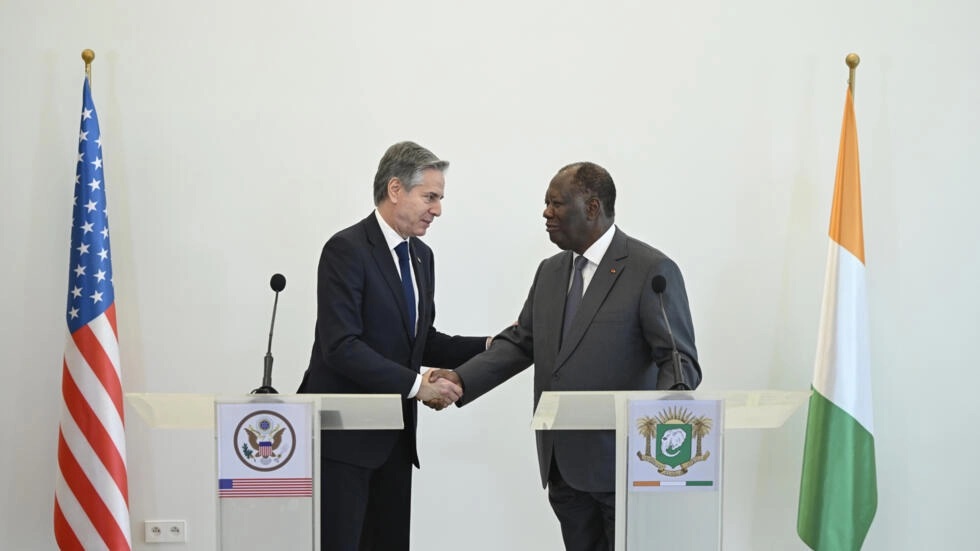
US Secretary of State Antony Blinken (L) met Ivorian President Alassane Ouattara (R) on the latest leg of a tour of African nations. Credit-AFP
Last year saw President Mohamed Bazoum of the Niger Republic–a crucial US ally–forcibly ousted from power by disgruntled US-trained military officers. This coup dealt a significant blow to Niger’s sprouting democracy, as President Bazoum had ascended to power through the country’s first democratic elections. Moreover, it marked a setback to the longstanding US endeavours to foster democracy in the Sahel.
Facing international pressure, the coup plotters justified their actions by pointing to President Bazoum’s perceived inability to effectively address the threat of insurgency in the country, despite substantial investments by the US in regional security.
Since 2012, the US has allocated more than USD 500 million in security assistance to Niger, positioning it as the leading recipient of US military aid in West Africa and the second-highest in sub-Saharan Africa.
In addition to having troops on the ground, the US currently operates a drone base in sub-Saharan Africa, a USD 100 million facility based in Agadez. However, despite these advancements, counterinsurgency operations funded by taxpayers have given rise to splinter groups associated with jihadist militancy, causing distress in villages and towns.
Experts attribute the insurgency in Sub-Saharan Africa to the US-led invasion of Libya, which failed to bring stability to the country and resulted in the proliferation of arms and violent groups across the region when foreign fighters, especially the Turareg rebels loyal to Libya’s dictator, Colonel Muammar Gaddafi, fled the country after his death.
For the US, Russia’s expanding influence in Africa is a cause for worry. The rivalry between the two nations intensified significantly following Russia’s invasion of Ukraine in 2022. Russia justified its actions by citing the US-led NATO expansion in Ukraine, which it deemed a threat. Although the US has refrained from direct involvement in the conflict, it has provided substantial financial and military assistance to Ukraine.
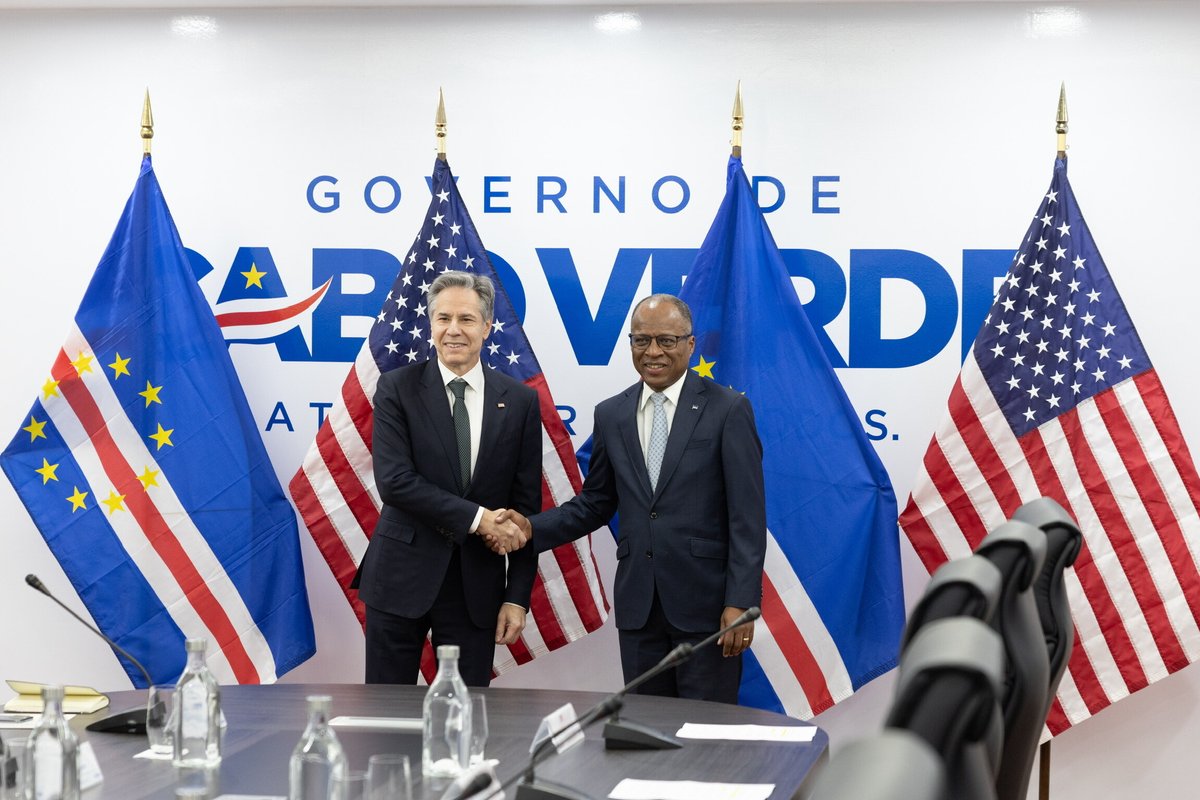
US Secretary of State Antony Blinken meeting with Cape Verde Prime Minister Ulisses Correia e Silva, at the Government Palace in Praia, Cape Verde. Credit-AFP
Meanwhile, tensions between the US and Russia are escalating in Africa. This is evident as coup plotters, many of whom have undergone military training in the US, are now ditching the West to seek military support from the Russian-backed private military Wagner group in their efforts to combat terrorism. Russia is also actively seeking to gain influence in Africa and challenge the dominance of the dollar through the BRICS.
Blinken’s visit coincides with a period when America’s influence is perceived to be at a low point in the recent scramble for Africa. What the US needs to do now is go beyond merely advocating for democracy and should actively match China and Russia’s efforts by deploying both financial and developmental resources. The U.S. has to ensure that the speeches are followed by deed and concrete action then African countries will have no choice than to play their part.

